
Als u op zoek bent naar dividendgroei tegen een redelijke prijs, is een van de beste plaatsen om te beginnen de Dividend Aristocrats.
Sorry. We bedoelen niet die Dividend Aristocraten. We bedoelen hun buren aan de overkant van de vijver:de European Dividend Aristocrats.
De European Dividend Aristocrats is, zoals de naam al doet vermoeden, een verzameling Europese dividendaandelen die bekend staan om hun gestage en groeiende uitbetalingen. En deze subset van de S&P Europe 350 Index heeft de neiging om veel meer uit te steken dan zijn Amerikaanse tegenhangers, aangezien constant stijgende dividenden in heel Europa veel ongebruikelijker zijn.
Er zijn natuurlijk verschillen. De S&P 500 Dividend Aristocrats moeten minimaal 25 opeenvolgende jaarlijkse dividendverhogingen opleveren. Daarentegen hoeven Europese Dividendaristocraten slechts 10 jaar stabiel of stijgend te tonen dividenden.
Voor de periode van 10 jaar die eindigde op 2020 hadden de European Dividend Aristocrats een totaalrendement van 12,5% op jaarbasis gegenereerd, een respectabele prestatie in vergelijking met het rendement van 10% van de benchmark-index van de eurozone en het rendement van 13,5% van Amerikaanse aristocraten. Maar wat nog belangrijker is, voor waardezoekers:de Europese dividendaristocraten handelen momenteel voor een gemiddelde K/W van minder dan 16, tegenover meer dan 19 voor de Amerikaanse aristocraten.
Lees verder om alle 39 Europese dividendaristocraten te ontdekken. Als u overweegt te beleggen in een van de volgende internationale dividendaandelen, houd er dan rekening mee dat alle aandelen hier in de VS genoteerde aandelen hebben, maar ze zijn niet allemaal hetzelfde. Sommige hebben noteringen op de belangrijkste Amerikaanse beurzen. Anderen worden 'over-the-counter' verhandeld, maar hebben nog steeds een hoog dagelijks volume, wat betekent dat u waarschijnlijk dicht bij de prijs koopt en verkoopt die u ziet. Maar enkelen hebben zeer weinig OTC-aandelen verhandeld; als je die koopt, gebruik dan limietorders om ervoor te zorgen dat je binnenkomt tegen de prijs die je echt wilt.

België's UCB (UCBJF, $96,43) is een biofarmaceutisch bedrijf dat gespecialiseerd is in behandelingen voor neurologische en immunologische ziekten. De bekendste geneesmiddelen van UCB zijn Cimzia (auto-immuunziekte en ontstekingsziekte), Vimpat, Keppra en Briviact (epilepsie) en Neupro (ziekte van Parkinson). Geneesmiddelen in een laat stadium van ontwikkeling zijn onder meer bimekizumab (psoriasis) en dapirolizumab pegol en staccato alprazolam (epileptische aanvallen).
Het bedrijf breidt zijn pijplijn uit via acquisities; in 2020 waren dat onder meer de afronding van de aankopen van Ra Pharma en Engage Therapeutics. Ra Pharma breidt UCB's leiderschap in behandelingen voor myasthenia gravis uit en Engage levert nieuw epilepsiemedicijn.
Een sterke prestatie van UCB's geneesmiddelenportfolio zorgde voor een verkoopwinst van 9% en een groei van de kernwinst per aandeel van 3% in 2021. Het bedrijf streeft naar een winst per aandeel voor 2021 variërend van € 5,60 tot € 6,10, een stijging van 12,5% jaar-op-jaar in het midden.
Het bedrijf verwacht een piek in de verkoop van Vimpat in 2022, Cimzia in 2024 en Briviact in 2026. De uitbreiding van de verkoop van nieuwere medicijnen biedt voldoende startbaan voor algemene omzetgroei.
UCB is een van de nieuwste Europese dividendaristocraten. Het heeft sinds 2006 dividenden uitgekeerd en heeft de uitbetaling sinds 2010 gestaag verhoogd, inclusief een stijging van 2,5% in 2020.

Givaudan (GVDNY, $ 79,15) is een Zwitserse fabrikant en verkoper van geuren en producten voor persoonlijke verzorging, evenals smaakstoffen, dranken en voedingsmiddelen. Het heeft het marktleidende aandeel in fijne geuren.
Het bedrijf brengt ongeveer 122.600 verschillende producten op de markt en blijft sterk gefocust op het uitbreiden van zijn productlijn via R&D, die aan de gang is in 69 onderzoekscentra wereldwijd. Givaudan heeft al 3.600 actieve patenten. De verkoop vindt wereldwijd plaats. Het bedrijf genereert 58% van zijn omzet in ontwikkelde landen en 42% van zijn omzet in opkomende markten.
Ondanks de pandemie leverde Givaudan sterke prestaties in 2020, met een omzetstijging van 4% en een EBITDA van 10%. Het genereren van vrije kasstroom was uitstekend met 12,8% van de omzet. In de afgelopen vijf jaar heeft het bedrijf een jaarlijkse omzetgroei van bijna 5% en een vrije kasstroom van gemiddeld 12,6% van de omzet gegenereerd.
Givaudan streeft naar een organische omzetgroei van 4% tot 5% per jaar, wat het wil bereiken door zijn productportfolio uit te breiden naar nieuwe gebieden zoals voeding, voedingsingrediënten en schoonheid en door gebruik te maken van zijn marktleiderschap in China.
Het dividend van Givaudan is sinds 2009 elk jaar gestegen, met een jaarlijkse groei van meer dan 3,5% per jaar in de afgelopen vijf jaar. Dat is inclusief een verbetering van 3,2% in 2020. Vanwege de uitstekende vrije kasstroomgeneratie is Givaudan comfortabel met een relatief hoge uitbetaling van 80% uit inkomsten.

Zwitsers RE (SSREY, $25,22) is een toonaangevende wereldwijde groothandel in herverzekeringen en verzekeringen. Het bedrijf verkoopt rechtstreeks en via makelaars aan ongeveer 2.300 klanten wereldwijd, waaronder verzekeringsmaatschappijen, middelgrote tot grote ondernemingen en overheidsinstanties. Het is actief via 80 kantoren over de hele wereld die eigendoms- en ongevallenherverzekeringen, levens- en ziektekostenherverzekeringen en gemengde oplossingen voor zakelijke klanten op de markt brengen.
In zijn Property &Casualty-segment werkt Swiss RE aan het vergroten van de verzekeringstechnische marges om de lagere rentetarieven te compenseren. Het bedrijf streeft naar een gecombineerde ratio van 96% in 2021. In zijn Leven &Zorg-activiteiten ligt de focus op het genereren van nieuwe business, met name in Azië, en het leggen van een basis voor toekomstige winstgroei. Het nieuwe digitale verzekeringsplatform van het bedrijf, iptiQ, draagt hieraan bij. IptiQ heeft al 40 distributiepartners, 500.000 klanten en meer dan $300 miljoen aan bruto geschreven premies binnengehaald.
Hoewel de gevolgen van COVID ertoe leidden dat Swiss RE in 2020 een nettoverlies boekte, begon het bedrijf vanaf het kwartaal van september weer winstgevend te groeien. Swiss Re rapporteerde een verlies over het hele jaar van $ 878 miljoen; ter dekking van COVID-19-gerelateerde claims en reserves, bedroeg het netto-inkomen $ 2,2 miljard, wat aanzienlijk hoger was dan de $ 727 miljoen van 2019. En in het kwartaal van september sloot het bedrijf een bedrijfsverkoop die resulteerde in een dividendbetaling van $ 1,5 miljard aan Swiss Re.
Deze Europese dividendaristocraat heeft sinds 1994 jaarlijkse dividenden uitgekeerd en de uitbetaling in 2020 met 5% verhoogd, nadat het in 2019 met 12% was verhoogd.

Partnergroep (PGPHF, $ 1.365,00) is een Zwitsers private equity-bedrijf dat ongeveer 900 institutionele klanten bedient en ongeveer $ 109 miljard aan activa beheert. Het bedrijf investeert in particuliere schulden, onroerend goed, infrastructuur en aandelen in verschillende geografische gebieden en sectoren. Het belegt voornamelijk in niet-cyclische industriële, gezondheidszorg- en farmaceutische outsourcingbedrijven.
Als private equity-investeerder behoort Partners Group tot de top van wereldwijde buy-outmanagers.
Het beheerd vermogen van het bedrijf is sinds de beursintroductie (IPO) in 2006 elk jaar gestegen. In 2020 steeg het beheerd vermogen van Partner Group met 11% en stroomde $ 16 miljard aan nieuwe klantenfondsen het bedrijf binnen. Het bedrijf verwacht dat de instroom in 2021 zal variëren van $ 16 miljard tot $ 20 miljard en verwacht dat de geleidelijke afname van de COVID-gerelateerde onzekerheden de vraag op de private equity-markt zal stimuleren.
Partner Group rapporteerde een omzetdaling van 12% in 2020. Dat was voornamelijk het gevolg van dalende prestatievergoedingen, die zwaar werden beïnvloed door COVID-19, hoewel de beheervergoedingen zelfs met 1% verbeterden. Alles bij elkaar heeft het bedrijf een winstdaling van ongeveer 11% opgelopen.
Het dividend van de Partner Group is sinds 2008 elk jaar gestegen, met een groei in het afgelopen decennium van meer dan 20% per jaar.

Experian (EXPGY, $ 35,03) is een Iers-Amerikaans bedrijf dat gespecialiseerd is in consumentenkrediet. Het bedrijf houdt kredietinformatie bij over ongeveer 220 miljoen Amerikaanse consumenten en 40 miljoen Amerikaanse bedrijven. Experian haalt 63% van de omzet uit Noord-Amerika, 15% uit het VK en Ierland, 14% uit Latijns-Amerika en 8% uit Azië-Pacific.
Het bedrijf werd opgericht als een kredietinformatiebron voor kredietverstrekkers en consumenten, maar heeft sindsdien zijn klantenbestand uitgebreid met telecom, overheidsinstanties, autodealers, ziekenhuizen en andere industrieën.
Experian groeide in fiscaal 2020 met 9% en EBIT met 5% en maakt ondanks de pandemie een goede start in fiscaal 2021. De inkomsten overtroffen de verwachting en stegen met 9% in het decemberkwartaal, aangedreven door bijdragen van de Noord-Amerikaanse en Aziatische activiteiten van het bedrijf. Het management voorspelt 2021 EBIT (winst vóór rente en belastingen) variërend van $ 1,35 miljard tot $ 1,38 miljard, ongeveer gelijk aan de $ 1,39 miljard aan EBIT die vorig jaar werd geproduceerd.
Experian verhoogde zijn dividend met 1% in 2020. Dit jaar kondigde het een interim-dividend van 15 cent aan, betaalbaar in februari 2021, dat gelijk is aan het interim-dividend dat vorig jaar werd uitgekeerd.

Hexagon AB (HXGBY, $ 95,54) biedt hightech tools voor geospatiale kaarten en industriële toepassingen.
Diensten worden geleverd in twee segmenten; de Industrial Enterprise Solutions Group bouwt systemen die nauwkeurige metingen leveren die nodig zijn voor computerondersteund ontwerp, fabricage en engineering. Het segment Geospatial Enterprise Solutions bouwt systemen die gegevens van land en lucht vastleggen, satellieten positioneren en 3D-kaarten en -modellen genereren. Het bedrijf heeft zijn hoofdkantoor in Zweden en bedient klanten in 160 landen.
Landmeten is het grootste bedrijf van Hexagon, goed voor ongeveer 20% van de omzet.
Hoewel de omzet en winst van Hexagon in 2020 daalden, behaalde het bedrijf in december een recordresultaat en verbeterde de cashflow. China en geospatiale diensten waren de belangrijkste groeimotoren van het kwartaal, met respectievelijk 25% en 7% organische groei. Hexagon streeft ernaar dat de vraag uit zijn industriële segment in 2021 terugkeert naar het genormaliseerde niveau.
Het bedrijf verhoogde zijn dividend in 2020 met 5% en stelde ook een 7-voor-1 aandelensplitsing voor. Hexagon heeft in vijf jaar een jaarlijkse dividendgroei van bijna 14% gerealiseerd.

Frankrijk's Hermès International (HESAY, $ 113.18) is een toonaangevende leverancier van luxe accessoires en lederwaren, verkocht via zijn netwerk van 311 boetieks in 45 landen. Meer dan 180 jaar geleden opgericht als zadelmaker, Hermès International is uitgegroeid tot een vooraanstaand luxemerk dat het grootste deel van zijn omzet genereert in Europa, Azië en de VS.
Na een moeilijk begin van 2020 veroorzaakt door COVID-gerelateerde lockdowns, Hermès International groeide weer tijdens het kwartaal van september, met een omzetstijging van 7% als gevolg van het sterke klantenverkeer in de winkels van de groep, het momentum in Azië en de over het algemeen verbeterende omstandigheden in Europa en de VS. Voor het volledige jaar daalde de omzet met 6%.
Investeringsonderzoeksbureau UBS vertelde zijn klanten onlangs dat luxemerken zoals Hermes het marktaandeel in China vergroten en HESAY gerangschikt als een topkeuze in de luxegoederensector.
Het bedrijf hield zijn dividend van € 4,55 per aandeel vorig jaar stabiel vanwege COVID. In het verleden bedroeg de dividendgroei gemiddeld bijna 11% per jaar. Net als een paar andere Europese dividendaristocraten, Hermès keert ook af en toe speciale dividenden uit.
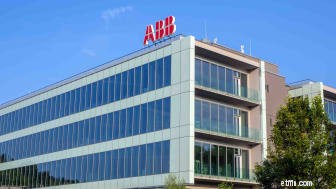
ABB (ABB, $ 31,21) produceert instrumenten die worden gebruikt in elektrificatie, industriële automatisering, beweging en robotica-toepassingen en bedient klanten in de nutsbedrijven, industrie, transport en infrastructuur. Dit Zwitserse bedrijf levert infrastructuur voor laadstations voor elektrische voertuigen, verwarming op zonne-energie, geautomatiseerde distributie en andere hightech toepassingen.
ABB heeft de nummer 1, 2 of 3 marktaandelen in de meeste van zijn markten en telt Siemens (SIEGY), Emerson Electric (EMR), Honeywell (HON), Rockwell Automation (ROK) en General Electric (GE) tot zijn lange- vaste klanten.
Trends die de langetermijngroei van ABB stimuleren, zijn onder meer de vraag naar elektriciteit die twee keer zo snel stijgt als die van andere energiebronnen, meer automatisering en productietoepassingen voor kunstmatige intelligentie.
ABB leed in 2020 een omzetdaling van 6% als gevolg van COVID-gerelateerde industriële stilstanden, maar de basis-WPA steeg met 261% dankzij een winst van $ 5,3 miljard op de verkoop geboekt op de Power Grids-activiteiten van het bedrijf. ABB is van plan om de $ 7,6 miljard contante opbrengst van de verkoop terug te geven aan investeerders, onder meer via een nieuw $ 4,3 miljard aandeleninkoopprogramma.
Dit jaar is ABB van plan om zijn bedrijfsactiviteiten volledig te decentraliseren, wat een jaarlijkse kostenbesparing van $500 miljoen zou moeten opleveren.
Het bedrijf keert jaarlijks dividend uit. Hoewel de betalingen niet elk jaar zijn gestegen, zijn de dividenden meer dan verdrievoudigd over een periode van 14 jaar.

In het VK gevestigde Ashtead Group (ASHTY, $ 249.75) exploiteert een wereldwijd verhuurbedrijf voor apparatuur met locaties in de VS, het VK en Canada, voornamelijk onder de naam Sunbelt Rentals. Het bedrijf verhuurt een verscheidenheid aan gereedschappen en industriële apparatuur aan meer dan 745.000 klanten wereldwijd in de bouw, nutsvoorzieningen, infrastructuur, entertainment en noodhulp.
Het Sunbelt-bedrijf in de VS is het op één na grootste apparatuurbedrijf in Noord-Amerika. Het exploiteert 840 winkels en draagt voor 86% bij aan de totale omzet. Sunbelt heeft ook 75 locaties en een marktaandeel van 4% in Canada.
De Britse activiteiten van het bedrijf zijn de grootste materiaalverhuurder van dat land, met 193 winkels en een bijdrage van 9% van de totale omzet.
Tijdens fiscaal 2020 dat eindigde in juni, groeide de omzet van Ashtead Group met 9%, aangedreven door 10% groei in de VS en 22% groei in Canada. Het bedrijf opende vorig jaar 105 nieuwe winkels, wat zorgde voor een lichte winst in winst per aandeel en een verdubbeling van de vrije kasstroom tot een record van £ 792 miljoen.
Hoewel COVID de resultaten over de eerste helft van 2021 temperde, was Ashtead Group in staat een recordvrije kasstroom te genereren, wat een goed voorteken is voor toekomstige dividendgroei. Bovendien verminderde het bedrijf zijn financiële hefboomwerking tot een bescheiden 1,7 keer de EBITDA (winst vóór rente, belastingen, afschrijvingen en amortisatie) en hervatte het de uitbreiding door drie nieuwe winkels te openen.
Ashtead Group verhoogde zijn dividend in 2020 met 2% na een forse verhoging van 21% in 2019. Betalingen worden halfjaarlijks gedaan.
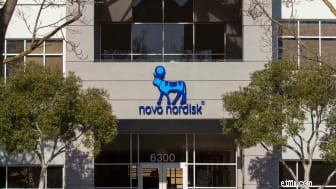
Denemarken Novo Nordisk (NVO, $ 67,89) is gespecialiseerd in behandelingen voor diabetes en obesitas en ontwikkelt ook medicijnen voor hemofilie en aan groeihormoon gerelateerde aandoeningen. Het bedrijf levert bijna de helft van 's werelds insuline vanuit productielocaties in Brazilië, China, Denemarken, Frankrijk en de VS.
Novo Nordisk heeft enorme adresseerbare markten. Wereldwijd leven 463 miljoen mensen met diabetes, 650 miljoen mensen lijden aan obesitas en 450.000 mensen lijden aan hemofilie.
De strategische doelen van het bedrijf voor de komende vijf jaar zijn onder meer het vergroten van het aandeel van de diabetesmarkt tot een derde en het verdubbelen van de omzet in de obesitasmarkt. Novo Nordisk verhoogde de verkoop van diabetes met 8% in 2020 en het marktaandeel van diabetes tot 29%. De totale omzet groeide met 4%, de winst per aandeel steeg met 10% en het dividend steeg vorig jaar met 7%. Novo Nordisk streeft naar een omzetgroei van 5% tot 9% en een winstgroei van 4% tot 8% in 2021.
Hoogtepunten van de R&D van het decemberkwartaal zijn onder meer een FDA-indiening voor semaglutide, een eenmaal per week uitgevoerde diabetesbehandeling; een aanvraag van de Europese Unie voor een wekelijkse therapie voor gewichtsbeheersing; en de lancering van klinische proeven in een laat stadium voor een geneesmiddel tegen de ziekte van Alzheimer. Het bedrijf verwierf ook een gepatenteerde technologie voor medicijnafgifte via de aankoop van Emisphere.
Aangezien diabetes een chronische aandoening is, creëren de insulineverkopen van Novo Nordisk een robuuste terugkerende cashflow die de sterke R&D-investeringen en stijgende dividendbetalingen van het bedrijf ondersteunt.
Novo Nordisk keert halfjaarlijks dividend uit. In de afgelopen vijf jaar heeft deze Europese dividendaristocrat zijn totale dividend met een gezonde jaarlijkse jaarlijkse clip van 12% verhoogd.

Britse M&G (MGPUF, $ 3,03) is onlangs een spin-off van Prudential (PUK) en is een van 's werelds toonaangevende vermogensbeheerders, met meer dan 5 miljoen particuliere klanten en 800 institutionele klanten over de hele wereld.
In het VK en Europa biedt M&G een verscheidenheid aan langetermijnspaar- en beleggingsproducten, waaronder PruFund, een familie van fondsen die gericht zijn op langetermijngroei met minimale volatiliteit. In Amerika, Afrika, Azië en Australië biedt het bedrijf directe vermogensbeheerdiensten.
M&G is ongebruikelijk omdat het zowel eigenaar als beheerder van activa is, samen met zijn klanten investeert en kapitaal sneller inzet dan anderen. M&G is niet alleen een van Europa's grootste vermogensbeheerders, maar ook een van de grootste vastrentende specialisten in het VK en een toonaangevende wereldwijde beheerder van particulier vermogen.
The company benefits from global trends that include an aging world population and more than €10 trillion of investable cash held by European investors.
As part of Prudential, M&G delivered 15 years of rising dividends. In 2019, the company paid an ordinary dividend of 11.92 pence per share and a special demerger dividend of 3.85 pence. The company paid an interim 2020 dividend of 6.0 pence in August and plans to pay a 12.23-pence final dividend in April 2021.

Enagas (ENGGY, $11.10) is Spain's leading natural gas distributor, providing services via 11,000 kilometers of gas pipelines, three underground storage facilities and four regasification plants. In addition, Enagas holds a stake in a regasification plant in Mexico and a major gas pipeline and compressor station in South America. The company also has investments in a LNG terminal in Chile and a gas transportation businesses in Peru.
Enagas' biggest equity partnership is the construction of the Trans Adriatic Pipeline (TAP), which will bring gas to Europe from the Caspian Sea. After nearly five years of construction, commercial operations of the Trans Adriatic Pipeline commenced in November 2020, which should provide a nice boost to Engas' 2021 revenues and earnings.
The company is also an investor in Greek gas operator DESFA and Tallgrass Energy, a U.S. company that owns 11,000 kilometers of gas transmission pipelines.
During 2020, reduced demand for natural gas and electricity trimmed roughly 6% from Enagas' sales, but net profits rose 5% due to good expense controls and favorable exchange rates. The company has a strong balance sheet for a utility, with BBB+ debt ratings from both Fitch and Standards &Poor's and no significant debt maturities before 2022.
Enagas raised its dividend by nearly 3% in 2020 and also paid a modest special dividend.

Belgian holding company Groupe Bruxelles Lambert (GBLBY, $10.54) is one of Europe's largest investment firms. It holds sizable stakes in industry-leading companies such as Adidas (ADDYY) and Pernod Richard (PRDDF). A second business, Sienna Group, invests across leading fund managers. The overall value of the company's investment portfolio exceeded €18.9 billion in 2020.
During the first nine months of 2020, lower earnings from portfolio companies reduced GBL's net asset value and triggered a 29% decline in cash earnings. Despite this, the company's financial position remains solid. GBL has credit ratings of A+ and A1 from S&P and Moody's, respectively, and is one of Europe' highest rated investment managers.
The company has plenty of cash for investments and recently acquired a majority stake in Canyon, Germany's leading manufacturer of premium bicycles and electric bikes. Canyon has been growing sales more than 25% annually.
Over the past 15 years, the company has hiked its dividend 4.6% annually while also returning €5.9 billion to shareholders

British Intertek Group (IKTSY, $82.32) offers product testing, quality assurance and certification services through a network of more than 1,000 labs across over 100 countries. The company is the largest tester of consumer goods worldwide, serving customers in the construction, healthcare, food production and transportation industries.
Intertek Group has an impressive track record for consistent growth showing 10% annual sales gains and 11% yearly EPS gains since its 2002 IPO. Over the same period, dividends have expanded at a 16% annual rate, the highest dividend growth rate among the FTSE 100 companies.
Due to COVID impacts, Intertek reported a 6.7% revenue decline in 2020 on a constant-currency basis. Adjusted earnings dropped by a considerable 18.1%.
However, Intertek Group sees growth opportunities increasing due to the world's post-COVID focus on safety and sustainability, increased regulations and population growth.
The company's dividend growth over the past decade has averaged nearly 13% annually. Intertek Group paid a full-year dividend of 105.8 pence that was in line with 2019.
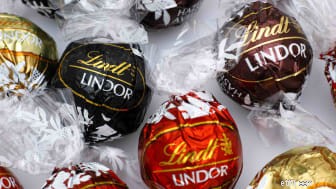
Founded over 175 years ago, Swiss chocolate-maker Lindt &Sprungli (LDSVF, $8,597.15) is the global leader in premium chocolates. The company sells its products under the Lindt, Hofbauer, Kufferle, Ghiradelli, Whitman's and Russell Stover brands. Sales are made through 500 company-owned shops worldwide that serve more than 80 million visitors a year and through other retail and e-commerce channels.
In the U.S., the world's largest chocolate market, Lindt has the No. 1 market share in the premium chocolate segment and is No. 3 in overall chocolate sales. The company is expanding its U.S. production facilities to support planned volume growth and making upgrades to its logistics network serving U.S. customers.
Lindt &Sprungli is guiding for a 5-7% sales decline in 2020 as a result of COVID-related temporary store shutdowns, but targets a return to 5% annual organic sales growth and improved EBIT margins in 2021.
The European Dividend Aristocrat's payout rose 5% in 2020 and Lindt &Sprungli also paid a modest special dividend. Dividend growth over the past decade has averaged around 7% annually.

Britain's Croda International (COIHY, $45.19) produces high-performance specialty chemicals used in personal care products, as well as in life sciences, performance technologies and industrial applications. The company operates in 38 countries and serves more than 17,000 customers. New patented or protected products contribute nearly 30% of Croda's annual sales.
Croda is developing new personal care products that address consumer demand for greater transparency of ingredients and life sciences products that boost food production. In addition, the company supplies excipients used by Pfizer in its COVID vaccine.
Croda's full-year sales actually improved by 1.1% on a constant-currency basis despite a difficult first six months of 2020. Free cash flow declined by 12.3%.
Croda International has increased dividends every year since 2001. Dividends are paid semi-annually, and the company occasionally also pays a special dividend. Croda marginally hiked its dividend in 2020 while maintaining payout at approximately 55%.

Dublin-based DCC (DCCPF, $81.89) operates large LPG (liquified petroleum gas) sales and marketing operations across the US, Europe and Asia and has a developing business in retail sales of natural gas and electricity. The company also deals in commercial fuels and heating oil and has profitable healthcare and technology businesses. DCC is a member of the FTSE 100 and has annual revenues exceeding £14.8 billion.
In its LPG operations, DCC has established a stable platform for further growth in Germany, Asia and the U.S. while venturing into adjacent fuel markets like natural gas and electricity that leverage its infrastructure and globally recognized brands.
DCC has delivered 14.5% annual growth in operating profits and 14% dividend growth over 26 years. During the six months ended in September, DCC's operating profits rose nearly 9%, fueled by strong contributions from its healthcare business. It has not yet released its full-year results.
DCC has paid a rising dividend every year since 2004. Dividends are paid semi-annually and rose 5% in fiscal 2020.
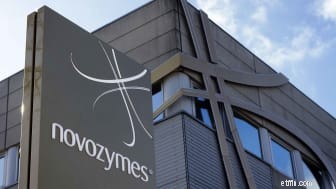
Danish Novozymes (NVZMY, $62.84) develops industrial enzymes and micro-organisms used in crop production, animal health, food and beverages and cleaning solutions. The company estimate 5.6 billion people worldwide use products containing Novozymes enzymes on a weekly basis.
Novozymes' sales were flat in 2020 and EPS declined 9% as a result of COVID-19 impacts on ethanol and textile production, which were partially offset by increased demand in household care products and from emerging markets. Novozymes launched Biofresh, a treatment for bad breath, last year, which was one of 18 new products launched in 2020. The company also closed two small acquisitions in the human health area.
Novozymes is targeting 2% to 6% organic sales growth in 2021, accompanied by 4% higher free cash flow.
The European Dividend Aristocrat aims to pay out 50% of earnings as dividends and returns excess cash to investors via share repurchases. Novozymes opted to hold its dividend steady at DKK 5.25 per share in 2020, which increased payout slightly to 52%. Over the past five years, Novozymes' dividend has grown approximately 12% annually.

BAE Systems (BAESY, $29.27) is Britain's largest defense contractor and a major supplier of weapons to the U.S. military. The company' derives 52% of revenues from sales of military aircraft, 26% from submarines and warships, and 17% from land-based combat vehicles. BAE also has a small but growing cybersecurity business. The U.S. military is BAE's principal customer, accounting for over 40% of sales. The company supplies Typhoon combat aircraft, subassemblies for F-35 fighters, submarines and warships to the U.S. military.
The company's revenues improved by nearly 4% in 2020, and adjusted earnings ticked 2.1% higher. Free cash flow jumped 60.8%, though that does exclude the impact of a large pension contribution in 2020. BAE's growth was fueled by increased sales of F-35s, land combat vehicles and electronic defense systems, partially offset continued weakness in the commercial portfolio.
BAE Systems has increased dividends every year since 1999, with the exception of 2019 when the company paid an interim but no final dividend. Nonetheless, it maintains its membership in the European Dividend Aristocrats with more than two decades of payout stability and growth.

Consumer products giant Unileve r (UL, $56.69) sells food, beauty care and personal care products used by over 2.5 billion consumers worldwide. The company is a dominant player in many product lines, with 81% of its brands ranking No. 1 or No. 2 in their markets. Unilever brands include Dove soap, Lipton tea, Hellmann's mayo, Breyer's and Ben &Jerry's ice creams, Tresemmé shampoo and Pond's and Noxzema skin softeners. Twelve of the company's brands generate sales greater than €1 billion ($1.1 billion) annually.
Unilever originally consisted of Dutch and U.K. subsidiaries, but the company consolidated its operations into a single entity in 2020. This operational streamlining is expected to reduce costs and make the business more agile.
The company's strategies for growth include expanding in emerging markets and growing its sustainable business, which consists of products (such as cleansers and detergents) that are biodegradable and less polluting.
Unilever's sales rose 2% in 2020 as a result of demand for home hygiene products and in-home foods that more than offset lower sales in other categories. Underlying EPS on a constant currency basis improved 4%. Over the longer-term Unilever is targeting 3% to 5% annual sales gains, profit growth that exceeds sales growth, sustainable strong free cash flow and over £2.0 billion of annual cost savings from its "Fuel for Growth" program.
Unilever pays quarterly dividends. The annual dividends grew 4% last year, and the European Dividend Aristocrat has already raised its quarterly dividend 6% in early 2021.
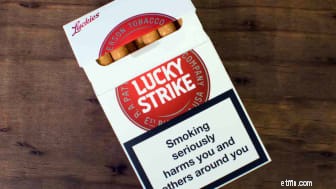
British American Tobacco (BTI, $38.65) holds the No. 2 share of the U.S. tobacco market and is a market leader in 50 countries. The company owned popular brands like Dunhill, Kent, Lucky Strike, Pall Mall and Rothmans and added the Newport, Camel and Natural American Spirit brands through the 2017 acquisition of Reynolds American.
BAT plans to offset declining cigarette volume by growing sales of its vaping, tobacco heating and modern oral tobacco products. The company's Vuse and Vype e-cigarettes are market leaders in the U.S., Canada and Europe. And its Velo and Lyft modern oral tobacco products are rapidly gaining share in Europe and the U.S.
During the first six months of 2020, BAT's adjusted EPS improved 7% as a result of an improved cigarette price/sales mix and an increased contribution from non-combustible tobacco categories, which rose 71% year-over-year. The company's preliminary 2020 results include a 0.4% decline in revenues, but 5.5% gains in adjusted EPS.
At present, the U.S. is the world's largest vaping market (12 million customers) and BAT anticipates the number of U.S. vaping customers will rise to 50 million by 2030. The company expanded its portfolio of modern oral tobacco products last November by acquiring the Dryft Modern Oral business, which will be rebranded with its Velo name.
This European Dividend Aristocrat transitioned from semi-annual to quarterly dividends in 2018 and increased dividend payments 4% in 2020.

UK-based Diageo (DEO, $169.66) is a global alcoholic beverage company making sales in over 180 countries. The company owns popular brands including Crown Royal and Johnny Walker (whisky), Captain Morgan (rum), Smirnoff (vodka), Tanqueray and Gordons (gin), Bailys (liqueur) and Guinness (beer).
Diageo plans to boost profits by expanding the premium content of its portfolio. It has recently entered new super-premium segments via the acquisition of Aviation American Gin, one of the fastest growing gin brands in the U.S. and the Davos brand portfolio, which includes Astral Tequila, Sombra Mezcal and TYKU Sake. In addition, Diageo plans to acquire the Chase Distillery, which produces Chase GB Gin and Chase Original Potato Vodka. U.K. demand for premium gins is growing twice as fast as the overall gin market.
Diageo achieved 1% organic sales growth during the six months ending in December, fueled by a favorable performance from its North American business. Operating profit fell 3% due to a less favorable channel and category mix.
Dividends are paid semi-annually. Diageo hiked 2020 dividends by 2% and announced an interim dividend payable in April 2021 that is 2% higher than last year. It's among a cadre of European Dividend Aristocrats that have provided steady or higher dividends for more than two decades.

Legal &General Group (LGGNF, $4.10) provides insurance products and services to customers in the U.S. and U.K. The company is the U.K. market leader in risk management and one of Europe's largest asset managers with more than £1 trillion of assets under management.
Its U.S. retirement products business has been a growth catalyst in 2020, contributing 40% growth and $1.6 billion worth of pension risk transfer transactions during the year. In addition, the company's U.S. reinsurance volume has been steadily increasing, with over $5 billion in volume written since 2015. The U.S. retirement products business experienced its strongest September quarter ever in 2020 and has plenty of room to run, given an addressable market estimated at $3 trillion.
Full-year operating profits, however, were flat despite growth in three of its five businesses.
Prior to 2020, Legal &General Group had generated 125% growth in operating profits, 131% EPS gains and 175% dividend growth since 2011. Its fastest-growing businesses – retirement solutions and pension risk transfer – have produced better than 20% annual growth.
Although the company plans to hold its 2020 dividend steady, Legal &General Group targets 3% to 6% annual dividend growth in 2021 and beyond.
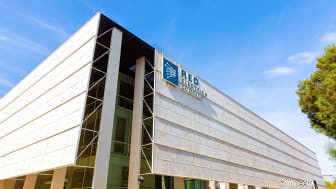
Spanish utility Red Eléctrica (RDEIY, $8.86) operates regulated electricity transmission and telecommunication businesses in Spain and internationally. The company owns nearly all of Spain's power grid, has a growing Latin American infrastructure business and recently expanded its telecom operations by acquiring one of Spain's leading communications satellite operators.
Red Eléctrica stepped up investments in international electricity infrastructure during 2020 via an acquisition in Brazil and development projects in Chile and Peru. In addition, the company is building a telecommunications satellite scheduled to launch in 2022. This satellite will provide coverage of the continental US, North Atlantic corridor and Greenland.
The company's net profits fell 4% on a 1% sales decline during the first nine months of 2020 as a result of reduced demand for electricity during COVID business shutdowns and regulatory adjustments that lowered Red Electricia's billable fees.
Red Eléctrica plans to invest €6.4 billion in electricity transmission infrastructure over the next five years and is seeking approval for its plan from EU authorities. Over 60% of the company's proposed spending is for renewables and international interconnections.
Like many European Dividend Aristocrats, RDEIY's dividends are paid semi-annually. It delivered a final dividend of 78 cents per share in 2020, up nearly 10% from one year earlier, but no interim dividend. An interim dividend of 27 cents was paid in January 2021. Annual dividend growth over five years has averaged approximately 8%.
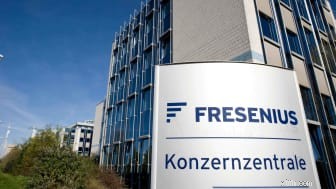
Based in Germany, Fresenius Medical Care (FMS, $37.15) is the world's leading provider of products and services for patients experiencing chronic kidney failure. The company provides dialysis services to nearly 350,000 patients worldwide through its network of 4,000 dialysis clinics. Fresenius is also the market leader in dialysis-related products such as hemodialysis machines and disposables.
Long-term growth drivers for the company's business include an aging global population, increasing incidences of diabetes and high blood pressure, and better-quality treatments. North America represents 70% of the company's revenues.
The company's revenues rose 5% on a constant currency basis during 2020 and adjusted net income improved 12%. Free cash flow surged 120% to €3.2 billion as a result of advanced payments under the CARES Act and other COVID relief and lower U.S. tax payments. Fresenius is guiding for lower 2021 EPS due to COVID effects but sees high single-digit earnings growth through 2025.
Dividend payments are made annually and the company plans to pay a €1.34 dividend in May, up 12% from last year and marking its 23rd consecutive year of dividend growth – good enough to put it among the top half of European Dividend Aristocrats by streak length.

England's Imperial Brands (IMBBY, $20.91) through its subsidiary Imperial Tobacco sells tobacco and e-vaping products worldwide. It is the world's fourth-largest tobacco company thanks to prominent brands that include John Player Special, Winston, Gauloises, Kool, West and Fine cigarettes, Montecristo and Habana cigars, and Blu e-cigarettes. Sales are made in 160 countries with the U.S., Germany, the U.K., Australia and Spain accounting for nearly 75% of operating profits.
The company anticipates its future growth will come from its next generation vaping, heated tobacco and oral nicotine products, which are expected to account for 20% of the nicotine market by 2025.
Imperial Brand's sales were relatively flat in fiscal 2020 ended in September; adjusted EPS declined 6% as a result of lower tobacco profits, increased regulatory costs and losses in the evolving next generation product category. The company sold its premium cigar business last year, used the proceeds to reduce debt, and converted 127% of earnings to cash. Imperial Brands is guiding for low to middle-single digit operating profit growth in 2021.
The European Dividend Aristocrat revised its dividend policy last May to prioritize debt reduction. However, the company has paid dividends continuously since 1997 and is committed to resuming dividend growth in the future. Over the past decade, dividends have grown nearly 6% annually.

Spirax-Sarco Engineering (SPXSF, $163.25) is a U.K. -based manufacturer of industrial and commercial steam systems, electric heating and temperature management solutions and fluid transfer pumps and related technology. The company is a global leader in steam systems and benefits from its resilient business model, which derives roughly 85% of revenues from essential maintenance and repair services for customers.
Revenues declined 4% in 2020, including by 3% on an organic basis. Adjusted basic earnings per share were off by 3% as well.
SPXSF already sells direct in 66 countries and anticipates future growth will come from increasing safety and clean energy regulatory requirements worldwide, geographic expansion, new products and bolt-on acquisitions.
The European Dividend Aristocrat offers an annual payout that improved 10% in 2020 and has risen every year since 1998.

Denmark's Coloplast (CLPBY, $15.05) develops and markets intimate healthcare products and services. It markets ostomy products and accessories under the Sensura and Brava brands, continence care products under the Speedicath, Persisteen and Conveen brands and wound care products under the Biatain brand.
Coloplast holds the leading global market share in ostomy and incontinence care and No. 4 and No. 5 market shares in interventional urology and wound care, respectively. Nearly 60% of Coloplast's sales are made in Europe, 24% are from other developed countries and 17% are from emerging markets.
Despite 2020 challenges due to the cancellation of many elective medical procedures, Coloplast's organic sales grew 4% and EBIT increased 5%. The company also launched its new Strive 25 corporate strategy that aims to increase efficiency via production line automation. This initiative also supports the company's goal of 7% to 8% organic sales growth.
The chronic care markets served by Coloplast provide recurring revenues and stable growth. Coloplast recently entered the $1 billion market for over-active bladder products by acquiring Nine Continents Medical, which is developing an implantable device for treating over-active bladder. This device could seek FDA approval as early as 2024.
Coloplast pays dividends semi-annually and grew payments 6% in 2020.

Swiss healthcare company Novartis (NVS, $86.30) is known for its blockbuster drugs Costentyx (arthritis), Gilenya (neurology) and Entresto (heart failure). Its portfolio includes five blockbuster drugs, each generating more than $1 billion of annual sales. The company has more than 40 new compounds in development and secured FDA approvals to commercialize 26 new treatments during 2020.
Novartis' sales from continuing operations rose 3% in 2020, driven by increased sales of Entresto, Zolgensma and Costentyx, which were partially offset by lower demand for ophthalmology, dermatology and consumer retail products. Net income from continuing operations grew 20% and 2020 free cash flow was 10% lower but still healthy at $11. 7 billion.
Novartis is guiding for low- to mid-single-digit sales growth in 2021 and mid-single digit operating income growth.
The European Dividend Aristocrat increased its dividend 2% in 2020, representing the 24th consecutive year of dividend increases since Novartis' founding in 1996.

Sage Group (SGPYY, $35.14) provides IT solutions to small and medium-sized businesses and serves millions of customers worldwide. This UK-based company offers cloud-based software tools for accounting, financial management, enterprise planning, HR, payroll and payment processing. The company benefits from spending on cloud-based software estimated to grow 11% annually and create a $33 billion addressable market comprised of 69 million small businesses over the next five years.
While Sage Group faces cost challenges recently from customers migrating to the cloud, the company enjoys 90% recurring revenues, excellent free cash flow conversion (123% of earnings) and a resilient balance sheet showing £1.2 billion of cash and investments and a 0.3% ratio of net debt-to-EBITDA.
Sage Group's organic sales rose 4% in 2020 and recurring revenues increased 8%, but operating profit declined 4% due to rising marketing costs. Sage Group targets 3% to 5% growth in recurring revenues in 2021, but lower operating profits due to increased investments in marketing and product development.
Sage Group pays dividends semi-annually. The European Dividend Aristocrat's total payout rose 2% in 2020 and dividends have increased every year since 2005.

Swiss food giant Nestlé (NSRGY, $115.47) is the world's largest food and beverage conglomerate. Its iconic brands include Stouffer's (frozen entries), Purina (pet food), Perrier and Poland Spring (water), Nescafé (coffee), Lean Cuisine (ready-to-eat meals), Haagen-Dazs (ice cream), and Gerber (baby food). Nestle's portfolio includes 34 brands that each generate over CHF 1 billion ($1.12 billion) in annual sales.
The company plans to boost profits by expanding in higher-growth categories such as coffee, pet care, infant nutrition, water and nutritional health. Nestlé also actively manages its portfolio and has acquired or divested more than 50 businesses since 2017. Recent acquisitions include Starbuck's consumer packaged tea and coffee business. Divestitures consisted of Nestle shedding its under-performing USA Confectionery and Gerber life insurance businesses last year.
In 2020, Nestlé's organic sales rose 3.6%, mainly as a result of strong growth in its premium pet food business. Underlying earnings improved by 3.5% on a constant-currency basis.
Nestlé positioned for higher growth in nutritional health products in 2021 by acquiring new collagen products, medical foods and treatments for life-threatening food allergies last year.
Nestlé is one of the oldest dividend payers among the European Dividend Aristocrats; the company has been paying dividends continuously since 1959. Nestlé's dividends grew 10% in 2020 to $2.70 per share.

British Bunzl (BZLFY, $32.79) benefited from robust COVID-related demand for cleaning products in 2020. The company is a leading distributor of cleaning solutions, safety equipment and healthcare consumable products. Its sales of masks, sanitizers, gloves, disinfectants, face shields and related equipment more than doubled last year, and was only partially offset by reduce demand from foodservice customers.
Much of the company's recent growth has come from acquisitions. Bunzl has closed roughly 160 acquisitions since 2004, in the process extending its reach to 31 countries. Transactions from 2020 included the purchase of a Canadian hygiene products company and a Brazilian distributor of protective equipment.
Bunzl's revenues grew by 9.4% on a constant-currency basis in 2020, while adjusted earnings shot 26.6% higher. Meanwhile, it grew the dividend from 51.3 pence to 54.1 pence – a 5.5% improvement. Bunzl has posted 27 consecutive years of dividend increases with annual dividend growth ranging around 10%.

EssilorLuxottica (ESLOY, $80.99) is the world's leading designer and manufacturer of ophthalmic lenses, frames and sunglasses. Headquartered in Paris, the company owns the Ray-Ban, Oakley, Varilux and Transitions eyewear brands and sells direct to consumers through its Sunglass Hut and LensCrafter retail stores. The business was created when lens manufacturer Essilor merged with eyeglass frame maker Luxottica in 2018 and retail stores were added to the mix by purchasing Dutch optical company Grandvision.
Essilor announced a collaboration with Facebook in September to develop Ray-Ban branded "smart" glasses, which will be available in stores beginning in 2021.
COVID-related store shutdowns triggered a 20% decline in Essilor's revenues during the first nine months of 2020, although sales rebounded in the September quarter. E-commerce was a particularly bright spot with September quarter e-commerce revenues up 40% year-to-date.
EssilorLuxottica, which has been among the European Dividend Aristocrats for more than a quarter-century, grew its dividend 35% in 2019 and paid an interim dividend of €1.15 in December 2020. A final dividend has not yet been announced.
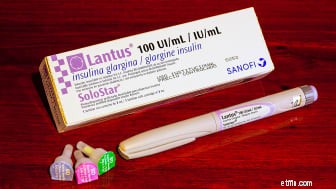
French drug-maker Sanofi (SNY, $49.97) specializes in medicines for diabetes, rare blood disorders, immune disorders, cancer and multiple sclerosis. The company also produces vaccines. Sanofi's blockbuster drugs include Lantus (diabetes), Dupixent (atopic dermatitis), Aubagio (multiple sclerosis) and Lovenox (cardiovascular). While Latus sales are declining due to generic competition, Sanofi is offsetting this decline with newer drugs like Dupixent, which grew revenues 74% in 2020.
The company's sales rose 3% in 2020, driven by Dupixent and influenza vaccine sales. Reported EPS was 338% higher due to capital gains from the company's sale of its stake in Regeneron. On an adjusted basis, EPS improved 4%. Sanofi is guiding for high-single-digit EPS growth in 2021.
In January, the company announced plans to acquire Kymab for a $1.1 billion payment upfront and $350 million of milestone payments. Kymab is developing a novel monoclonal antibody that treats a variety of immune disorders and inflammatory diseases.
The European Dividend Aristocrat paid a €3.20 dividend in 2020, up 2% from the prior year, and delivered its 27th consecutive year of dividend growth.
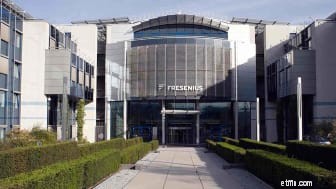
Germany's Fresenius SE (FSNUY, $11.49) is a global leader in healthcare services. The company owns a network of hospitals, a hospital supply business and a project management and construction business serving hospital groups. It also owns a 31% stake in dialysis-services provider Fresenius Medical Care.
Fresenius SE is the largest private hospital operator in Europe based on a network of 89 acute care hospitals, 128 outpatient clinics and six prevention centers that together treat 15.4 million patients annually.
In fiscal 2020, sales improved by 5%, but EBIT (earnings before interest and taxes) were level, and earnings per share declined by 3%.
The company has delivered an impressive 27 consecutive years of dividend growth. Dividends rose 12% in 2020 and growth over five years has exceeded 15% annually.

Dutch IT firm Wolters Kluwer (WTKWY, $89.48) provides professional information and software solutions and services for customers in the healthcare, tax and accounting, corporate governance, legal and regulatory industries. The company sells to customers in 180 countries, and derives roughly 62% of revenues from North America, 30% from Europe and 8% from Asia Pacific.
Recurring revenues represent more than 80% of total revenues and provide Wolters Kluwer with enough flexibility to consistently invest 8% to 10% of sales in product development and pay a rising dividend. The company anticipates future growth will come from extending its product lines and distribution channels and making bolt-on acquisitions that are accretive to EPS.
Reflecting a strong contribution from recurring revenues, Wolters Kluwer's overall sales rose 1% during 2020, adjusted operating profits improved 5% and adjusted free cash flow increased 16% on a constant-currency basis.
The company introduced a COVID-19 Enterprise Solution in 2020, acquired two businesses (XCM Solutions and eOriginal) and divested its ComplyTrack healthcare regulatory risk management tool for an undisclosed amount.
Wolters Kluwer has improved its payout for more than three decades. The company established a progressive dividend policy in 2007 and switched from annual to semi-annual dividends in 2015. Dividends rose 20% in 2019. In 2020, the company paid a €0.47-per-share interim dividend that was 40% less than the prior-year interim dividend. However, a final dividend of €0.89 will result in total payouts of €1.36, up 15% year-over-year.

Ireland's Kerry Group (KRYAY, $131.10) is a leading developer and manufacturer of specialty ingredients used to improve the flavor, appearance and health benefits of packaged foods. The company has manufacturing facilities in 148 sites and sales in more than 150 countries.
Kerry Group is the global market leader in flavorings used in dairy, savory, cereal, beverage and nutritional supplements and also supplies ingredients for five of the world's top 10 blockbuster drugs.
The company's strategies for future growth focus on expanding sales channels and its customer base by entering adjacent markets such as snack foods and food-to-go solutions.
Although COVID negatively impacted the company's first-half 2020 results, the business recovered strongly in the September quarter, generating volume that approached prior year levels. Kerry also acquired a Canadian manufacturer of probiotics and a Chinese supplier of savory flavorings during the September quarter.
Its preliminary expectations for full-year 2020 include a 4.0% decline in revenues, and a 9.4% drop in adjusted EPS.
However, since its 1986 IPO, Kerry Group has generated 10% annual growth in sales, 13% yearly adjusted EPS gains and 17% annual dividend rises. Going forward, Kerry Group targets 10% or higher annual EPS and dividend growth.
The company raised its dividend 10% in 2020, extending its record of payout hikes and continuing its membership in the European Dividend Aristocrats.

Swiss pharmaceutical Roche Holdings (RHHBY, $40.63) is the world's largest biotech company and a leader in in-vitro diagnostics and tissue-based cancer diagnostics. The company owns many of the world's top-selling oncology drugs such as Avastin, Herceptin, Rituxan, Perjeta and Tecentriq.
Roche faces challenges from generic competition for some cancer drugs and aims to offset this impact with newer drugs like Ocrevus (multiple sclerosis), which Roche believes could replace nearly half of the lost cancer sales.
Roche introduced four new medicines in 2020 and has 19 new compounds in late-stage development. The company began a major player in the COVID-19 space during 2020 by launching 15 coronavirus diagnostic products and developing four different medicines for treating COVID-19 infections currently in clinical trials.
Roche's sales grew 1% in 2020 as a result of robust sales of COVID diagnostics, which more than offsetting lower pharmaceutical sales attributable to generic competition. Core EPS rose 4% and Roche is guiding for low to mid-single digit revenue and EPS growth and a rising dividend in 2021.
Roche increased its dividend 3% in 2020, extending its record to 18 consecutive years of payout hikes. All told, it has delivered more than three decades of dividend stability or growth.

French firm L'Oreal (LRLCY, $78.69) is a world leader in skin care, hair care and cosmetics. Its iconic brand portfolio includes the Lancôme Paris, Garnier and Maybelline brands. The company has the No. 1 global share in the cosmetics market, offering 36 different personal care brands across 150 countries. Its products are sold in hair salons, drug stores, big box stores and via the Internet.
Because of its strong brands, L'Oreal was able to outperform the overall beauty market in 2020. The company anticipates a return to growth in 2021, fueled by product launches, maximizing its digital presence and e-commerce channels and expanding its presence in China.
L'Oreal has grown dividends 8% annually over the past 10 years. Shareholders who have owned the stock more than two years also qualify for a 10% loyalty bonus dividend.

U.K.-based Halma (HLMAF, $33.20) provides technologies for the safety, health and environmental markets. Its product line includes instruments for detecting gas leaks, explosions and corrosion and fire detection and suppression systems. Halma derives the majority of its sales in the U.S. and Europe.
The company has generated 17 consecutive years of rising sales and profits, driven by new products and niche acquisitions. Over this period, revenues have risen 10% annually and profits have increased at an 11% annual rate. However, COVID business slowdowns have impacted 2020-21 results; Halma's sales and profits were each down 5% during the first six months of 2020-21.
Halma is the longest-tenured of the European Dividend Aristocrats at more than four decades of payout growth. The company raised its dividend 5% in 2020, extending its consistent record of 5% or higher annual dividend hikes. Analysts look for Halma to deliver 11% adjusted EPS growth and 5% dividend growth in 2020-21.